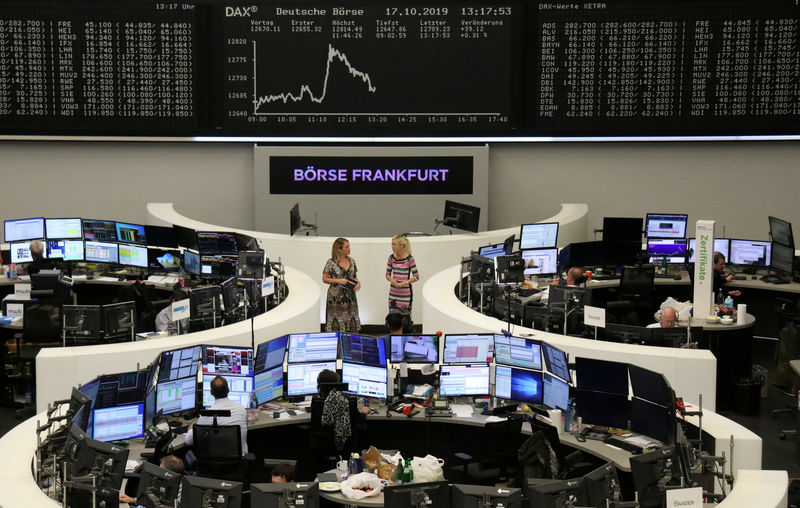By Tom Wilson
LONDON (Reuters) - World shares rose on Monday, as hopes for resolving the U.S.-China trade war and a belief that Britain will avoid a disorderly exit from the European Union gave investors cause for riskier bets.
MSCI's world equity index (MIWD00000PUS), which tracks shares in 47 countries, gained 0.2%. The Euro STOXX 600 (STOXX) added 0.4%.
The positive mood in Europe mirrored gains in Asia. There, MSCI's widest index of Asia-Pacific shares outside Japan (MIAPJ0000PUS) rose 0.3%, with Chinese shares (CSI300) gaining 0.3%.
Appetite for riskier assets was also supported as markets judged the chances of a disruptive no-deal Brexit were receding, even after Britain's parliament delayed a vote on Prime Minister Boris Johnson's deal to exit the EU.
Johnson will seek to put his Brexit deal to a vote on Monday, with the government proposing a debate on the agreement. Parliament was due to open at 1330 GMT.
It was unclear, though, whether parliament's speaker would allow a vote to go ahead. The decision should come around 1430 GMT, and any vote could come much later on Monday.
Investors in Asia earlier were boosted by comments on Friday by Chinese Vice Premier Liu He's comments that Beijing will collaborate with the United States to address mutual concerns on the trade war.
U.S. President Donald Trump had also struck an optimistic tone on Friday, saying he thought a trade deal would be signed before an Asia-Pacific Economic Cooperation meeting in Chile next month.
"They seem to making progress," said Jeremy Gatto, an investment manager at Unigestion in Geneva. "But we have seen in the past that everything seems to look great and then a couple of days later seems to deteriorate again."
The 2020 U.S. presidential election was also influencing the talks, investors said, with Trump looking to avoid the possibility of tariffs imposed by China hurting his voters.
"Trump realizes that some of the tariffs that potentially could be implemented toward the end of the year could affect the consumer, which would be bad for the U.S. economy - and obviously bad for him," Gatto said.
Wall Street futures
"It's a relatively low bar for U.S. corporates to beat on earnings for this quarter," said Hugh Gimber, global market strategist at J.P. Morgan Asset Management.
Market players, he said, were watching out for how slower economic growth could affect companies' results.
"What will be most important for the market will be whether or not companies start to guide toward lower earnings expectations in the next 12 months."
POUND AT 5 1/2-MONTH PEAK
The pound
Sterling had by Friday risen as much as 6.5% in seven trading days to a five-month high, underscoring market expectations that either a Brexit deal or delay was most likely. By late morning, it was trading at $1.2981.
Goldman Sachs (NYSE:GS) said it now sees the chance of a no-deal Brexit reduced to 5%, from 10% previously.
Still, some investors said that sterling's medium-term prospects were limited, even if no deal is avoided.
"I wouldn't be too bullish, because there is still going to be a huge amount of uncertainty going forward, even if the current deal is agreed," said Tim Drayson, head of economics at Legal & General Investment Management.
"If this deal does go through, ultimately it is still a relatively hard Brexit - we are out of the customs union - and it is still a deterioration in the UK terms of trade."
The dollar index against a basket of six major currencies fell 0.1% (DXY).
Euro zone bond yields also rose on the dwindling risk of a British no-deal exit. The benchmark 10-year German government bond's yield rose as much as 4 basis points to -0.334% (DE10YT=RR). Other yields from the euro zone core were also higher (FR10YT=RR).

In commodities, oil prices held steady on Monday, recouping some early losses. Brent crude oil futures (LCOc1) were down 62 cents, or 1%, to $58.80 a barrel by late morning.